Do home remedies work? Can papaya leaf juice help with dengue fever? What about neem leaf for chickenpox?
Natural or home remedies for ailments and illnesses don’t always taste or smell good, but some people recommend them anyway. Are they effective? CNA Lifestyle asks the medical experts.
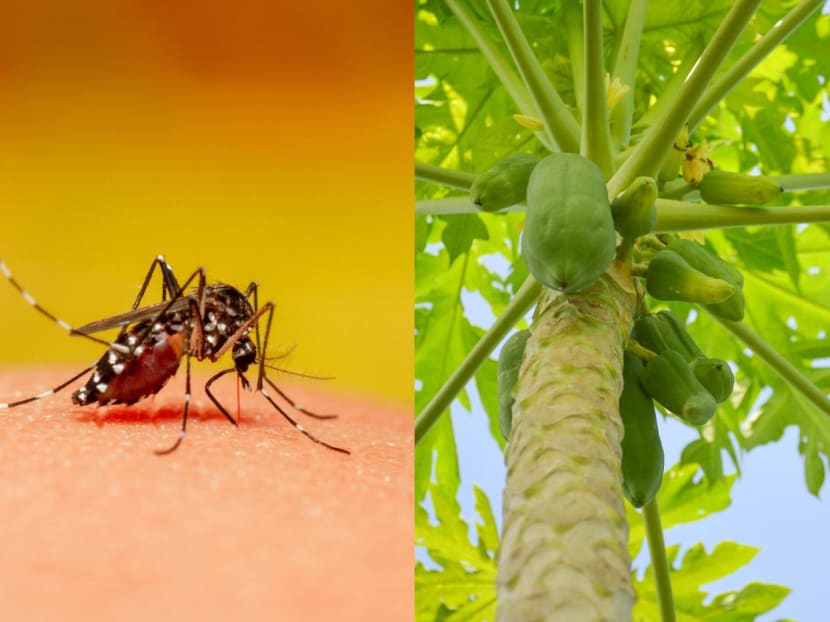
Can a home remedy made with papaya leaves help with dengue fever? (Photo: iStock/mansum008 and LoveSilhouette)
The last time I mentioned I’d hurt my knee in a group chat, my handphone didn’t stop pinging for a few good seconds. I was inundated with “remedies” ranging from the conventional (ice and elevate the joint), the unusual (mix apple cider vinegar with water and drink it), and something quite tasty (a recipe for collagen soup).
With dengue cases on the rise in recent times, you can imagine the surge in talk about papaya leaf home remedies in all the chat groups I’m in. “Can help to increase platelet count if you kena (get) dengue,” someone texted.
Contacts for supplies of fresh papaya leaves or loose, dried ones have been dominating the chats. “Try Etsy,” someone texted. “Picked and shipped from Sri Lanka, apparently.” This was followed by more pings, more recipes on what to do with the procured leaves.
I’d wager I’m not alone in this. I am sure there are also others who have had such unsolicited home remedies emailed or Whatsapp-ed to them from well-meaning family members, friends or colleagues. There’s always someone with a recipe for a tea, juice, soup or poultice for whatever ails you – and is ever-ready to dispense the information at the slightest “ah” of an “ah-choo".
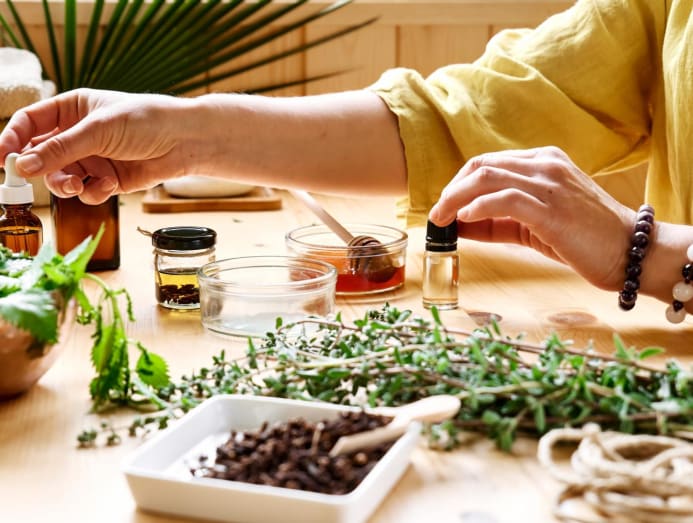
And I'm sure once this article's posted and shared on Facebook, you'll also find a long list of other natural or home remedies contributed by netizens.
IT'S NATURAL SO IT MUST BE SAFE, RIGHT?
The promise of eating this to cure that is a powerful one. For one, natural remedies give the impression that they're safe as they are usually plant-based, compared to pharmaceutical medications. Two, the ingredients may be easier and cheaper to obtain than the capsules and pills from the GP. There's also the immense assurance of being in charge of your own body and health.
But if only things were that cut and dry. While your colleague did not mean any harm by sharing the home remedy recipe with you, they do not know your medical history. Even if they have read reports that substantiate the benefits, they aren't doctors.
Take the case of the 67-year-old prostate cancer patient in Melbourne, who actually has a scientific background and who had read that apricot kernel extract could prevent his cancer from recurring.
It wasn't clear why the patient wasn't aware that apricot kernels contain amygdalin, a substance that the body converts into cyanide when digested. The patient was taking three tablets of an apricot kernel-based supplement as well as his own concoction every day, which added up to more than 17mg of cyanide a day. Just 0.5mg to 3.5mg of cyanide per kilogramme of body weight is already lethal.
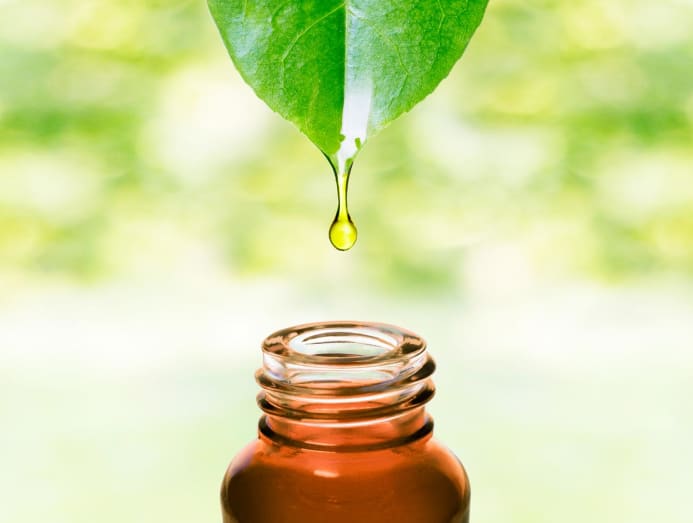
“People gravitate toward home remedies because they believe it’s better than taking a pill,” said Professor D Craig Hopp, the deputy director of the division of extramural research at the US National Center for Complementary and Integrative Health.
“At the same time, you have to decide when to seek a doctor’s advice. When you’re talking about nausea and upset stomach, fine, have at the ginger. But I wouldn’t urge someone to use cinnamon and forgo the Metformin (a medicine for blood sugar control)," he said in a Washington Post article.
What about the popularised "solution" for dengue fever and other "remedies" for chronic issues such as high blood pressure, water retention, indigestion and even specific problems, including lactation? Do they work? More importantly, can consuming and using these recipes cause any harm? We find out:
PAPAYA LEAF JUICE FOR COUNTERING FALLING PLATELET COUNT IN THOSE WITH DENGUE FEVER
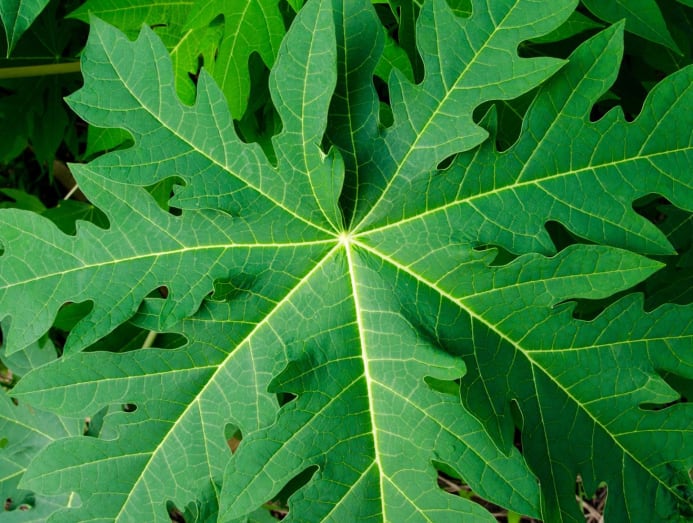
In addition to the temperature spike, intense headache, body aches and pains, loss of appetite, nausea, vomiting and skin rashes that dengue fever brings with it, another key concern is the drop in the blood platelet level or thrombocytopenia.
Experts still aren't sure why the dengue virus has such an effect on the platelets, though they hypothesise that the virus may affect the bone marrow, which is where the platelets are produced by your body.
Platelets are the components that help your blood to clot. When your blood platelet count is low (below 80,000 per ml of blood; normal levels range from 150,000 per ml to 450,000 per ml), you’ll notice symptoms such as an increased tendency to bleed in the gums, nose and other parts of the body as well as a propensity to bruise easily.
“There is no medicine or cure for dengue,” said Jaclyn Reutens, a dietitian and the founder of Aptima Nutrition & Sports Consultants. “You can only rely on your immune system to kick in and overcome the symptoms.”
If you think you have dengue fever, see a doctor immediately, advises the Ministry of Health. The fever may, though rare, progress to dengue haemorrhagic fever or dengue shock syndrome, which are severe forms of dengue infection that can result in death.
WHAT DOES IT CONTAIN? According to Reutens, papaya leaf juice seems to contain vitamins A, B1, C and K, magnesium, potassium, fibre, papain, phenolic compounds and other phytochemicals.
“These nutrients in the juice may help with blood clotting and may boost the immune system. Some studies have shown that the consumption of papaya leaf juice has increased some platelet counts.”
Lim Tze Chao, a traditional Chinese medicine physician from Parkway Shenton, added that papaya leaf juice may also provide anti-inflammatory effects, support digestive function and have the potential to lower blood sugar levels as seen in lab and animal studies.
IS IT SAFE/EFFECTIVE? Reutens notes there are "no known adverse side effects or contraindications reported".
Physician Lim meanwhile, adds that papaya leaves are “generally considered safe”. However, most of the research is conducted on animals and in test tubes; “more research is needed to prove that the same or similar beneficial effects may occur in humans”, he said.
“If you are pregnant or breastfeeding, it is recommended that you consult your healthcare provider first before consuming papaya leaves or its extract,” he said.
NEEM LEAF PASTE TO EASE CHICKENPOX ITCH
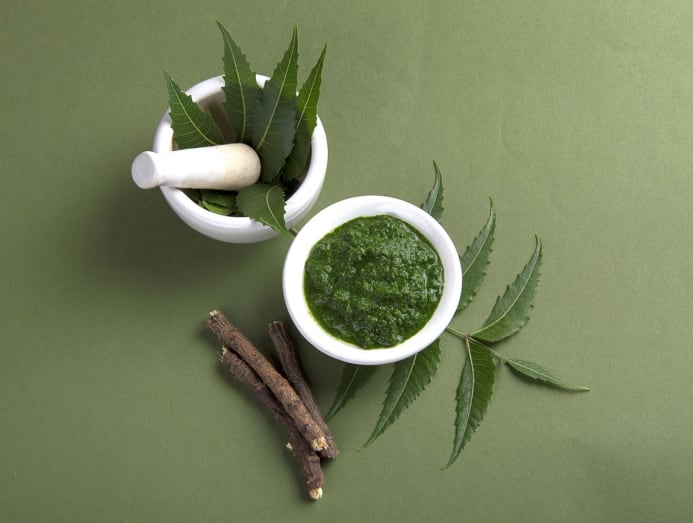
Chickenpox progresses from small, red spots on the skin to become fluid-filled blisters. Then, they dry up, scab over in a week or so, and fall off.
The blister stage is when the itch is the most intense as the blisters release the same chemicals that a mosquito bite does into skin to activate the itch nerves. Good thing is, the itch will start to abate after three to four days of the blisters’ appearance.
WHAT DOES IT CONTAIN? "Neem is often deemed as a medicinal plant," said Dr Eileen Tan, a dermatologist with Eileen Tan Skin Clinic & Associates. "Its extracts are commonly used for their antiseptic, anti-inflammatory, antioxidant and healing properties. It contains active constituents like nimbidin, nimbolide and azadirachtin that have medicinal properties."
The entire neem plant contains over 140 active compounds, according to Healthline. However, “the mechanisms by which neem works aren’t entirely clear, research into this plant is ongoing”.
The leaves appear to contain plant compounds called flavonoids and polyphenols, which have antioxidant, anti-inflammatory and antibacterial properties, according to Medical News Today.
Neem oil, which can be mixed into the leaf paste, seems to be beneficial as well. That’s because the oil is rich in fatty acids such as palmitic, linoleic and oleic acids, which help support healthy skin.
IS IT SAFE/EFFECTIVE? The United States Environmental Protection Agency considers the oil to have “low toxicity” and most people can use neem safely on their skin.
Nevertheless, Dr Tan warned that neem can "certainly cause allergy reactions" and has seen patients who have developed localised skin rashes or contact dermatitis because of neem paste. "The reactions may also be generalised such as hives and rashes, or breathing difficulties."
To be certain, dilute a little amount of leaf paste with water and test on a small patch of skin before applying it extensively.
MANGO LEAF TEA FOR IMPROVING DIGESTION AND HIGH BLOOD PRESSURE
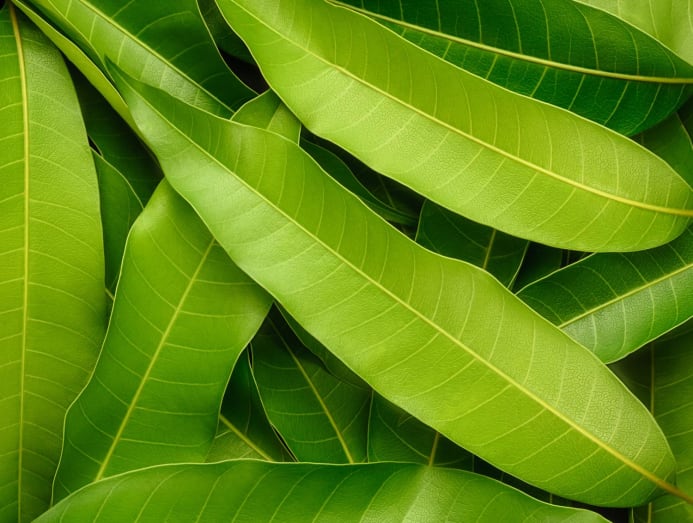
Hypertension or high blood pressure is usually remedied with pressure-regulating ACE inhibitors as well as a low-sodium diet and an increased intake of potassium from foods such as fruits, vegetables and wholegrains, said Reutens.
WHAT DOES IT CONTAIN? Nutritionally, the leaves may have more nutrients than the fruit. “Mango, as a fruit, is a great source of vitamin A, carotenoids and potassium,” said Reutens. “The leaves should also contain some of these nutrients and possibly, other micronutrients such as cadmium, copper and phosphorus.”
In some studies, the leaves seem to also contain powerful antioxidants such as anthocyanidins and polyphenols, she said.
IS IT SAFE/EFFECTIVE? From the TCM perspective, physician Lim highlighted some relevant benefits of mango leaves: Anti-inflammatory effects, the potential to regulate fat and sugar metabolism, and the potential to improve stomach ulcers and other digestive disorders.
However, Reutens notes that there is “little evidence” to show that the leaves can aid in digestion. As for their effect on blood pressure, “lowering your blood pressure is still very much dependent on your diet”, she said. “If you drank this concoction with little or no change to your current diet, it is unlikely to work.”
But there is no harm trying it, if there are no allergies, she said. “Combine the tea with a low-salt diet and observe the results,” said Reutens.
GREEN OR UNRIPE PAPAYA SOUP FOR INCREASING BREAST MILK PRODUCTION
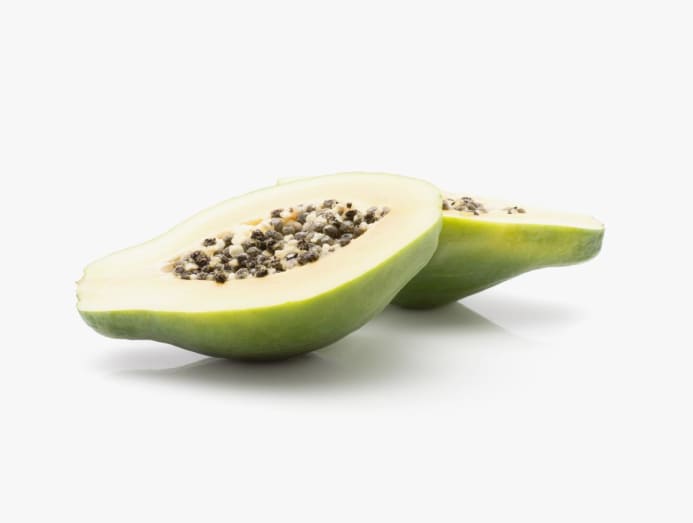
There are many factors that influence breastmilk supply, said Reutens, and they range from the let-down reflex, hormones (prolactin and oxytocin), the mother’s diet, fluid intake, stress level and sleep.
WHAT DOES IT CONTAIN? According to Natalie Goh Mei Yan, the chief dietitian at Mount Elizabeth Novena Hospital, the unripe fruit contains carbohydrates, dietary fibre and nutrients like vitamin A, vitamin C, folate (a form of vitamin B9) and potassium.
But not all the nutrients go into the soup – or into you. “During boiling, vitamin C and folate, both water-soluble vitamins, are destroyed,” said Goh. “A small amount of vitamin A is also lost during cooking, though to a lesser extent than the water-soluble vitamins.”
IS IT SAFE/EFFECTIVE? Whether the soup really helps depends on “many factors that can affect milk supply, for example, hydration and the mother’s physical state”, said Goh. For example, fatigue and stress can reduce breastmilk supply.”
“Some evidence showed that green papaya may increase the production of oxytocin, the hormone that helps with breastmilk supply,” said Reutens. “Many mothers have tried it with no harmful side effects. And since the soup will at least contribute to the mother’s daily fluid intake, this soup is definitely worth a shot.”
However, she cautioned against consuming green papaya if you are allergic to papaya or its latex.
CHERRY STEM TEA FOR ELIMINATING EXCESS BODY FLUIDS
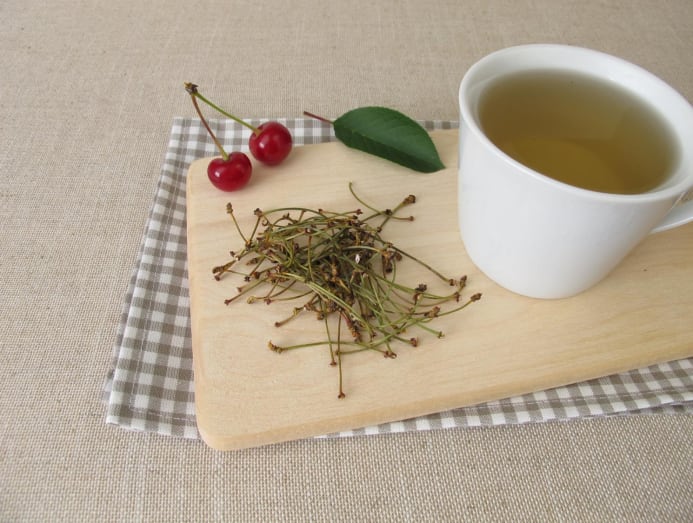
Water retention or edema occurs when there is a build-up of fluid usually in the legs, ankles, feet, hands and face. It happens when your hydration level is not balanced and your body reacts by holding on to water. It can also happen when you’ve been standing or sitting too long, or you’re pregnant. Having a high-sodium diet is another common cause of water retention.
WHAT DOES IT CONTAIN? Cherries are high in vitamin C, fibre, potassium and the phytochemicals anthocyanin and quercetin, according to Reutens. “The stems should contain some of these nutrients, too.”
These vitamins, minerals and phenolic compounds are known, in general, to have some anti-cancer benefits as well as heart health properties, she said. “In some studies, cherry fruit extracts had shown some diuretic properties, most likely from the phenolic compounds. The effective dosage is not conclusive.”
Physician Lim agreed that there are some potential health benefits in cherry stems, including potential antioxidant effects, potential diuretic effect and potential anti-microbial effects. However, they are “still poorly studied by the scientific community and more research is needed to study and characterise their potential effects”.
IS IT SAFE/EFFECTIVE? There is so little evidence on whether cherry stems can deliver on those benefits, you are better off eating the fruit to meet your daily fruit intake requirement, said Reutens.
Do not self-medicate if you have allergies or chronic health conditions such as asthma, diabetes or high blood pressure. Exercise caution for infants, children, the elderly as well as pregnant and breastfeeding women. When in doubt, seek a medical professional's opinion first.











